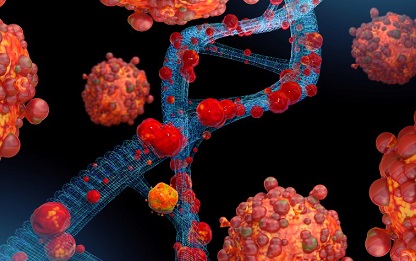Study Shows That SARS-CoV-2 Evolutionary And Mutation Rate Is Not Enhanced By Immunodeficiencies But Rather By Viral Persistence!
Nikhil Prasad Fact checked by:Thailand Medical News Team Mar 18, 2024 1 year, 10 months, 3 weeks, 4 days, 4 hours, 15 minutes ago
COVID-19 News: The global fight against the COVID-19 pandemic has spurred an intense exploration of the SARS-CoV-2 virus, delving into its evolutionary dynamics and interactions with host immune systems. Among the various avenues of research, understanding how immunocompromised individuals respond to and potentially influence the evolution of the virus has become a focal point. Recent studies, including research from the University of Padova in Italy that is covered in this
COVID-19 News report, have provided significant insights into this complex interplay, challenging existing assumptions and opening new avenues for exploration.
 SARS-CoV-2 Evolutionary And Mutation Rate Is Not Enhanced By
SARS-CoV-2 Evolutionary And Mutation Rate Is Not Enhanced By
Immunodeficiencies But Rather By Viral Persistence
Exploring Immunodeficiencies and Their Impact on SARS-CoV-2 Evolution
Immunocompromised individuals, characterized by weakened immune systems due to various factors such as medical treatments or underlying health conditions, have emerged as a distinct cohort in the study of COVID-19 dynamics. One of the key observations regarding this population is their tendency to experience prolonged SARS-CoV-2 infections, raising questions about how these extended interactions with the virus might contribute to its evolutionary trajectory.
Initially, it was hypothesized that compromised immune defenses in these individuals could create an environment conducive to viral evolution within the host. Factors such as reduced immune surveillance and the use of antiviral treatments were thought to potentially drive the accumulation of mutations in the viral genome. This, in turn, could lead to the emergence of new viral variants, impacting disease severity, transmissibility, and vaccine efficacy.
The Study Design: Unraveling the Puzzle Piece by Piece
To unravel the puzzle of SARS-CoV-2 evolution in immunocompromised patients, researchers at the University of Padova and the University Hospital of Padova designed a comprehensive study. Their approach involved a carefully curated cohort comprising both immunocompromised individuals and non-immunocompromised subjects, all of whom were undergoing SARS-CoV-2 infection.
The study's design included longitudinal sampling, where nasopharyngeal swabs were collected at multiple time points post-infection. This allowed researchers to track the viral evolution within each individual over time. Notably, the cohort received varied treatments, including antiviral agents and monoclonal antibodies, adding a layer of complexity to the investigation.
Advanced sequencing techniques, including deep sequencing and probe-based enrichment methods, were employed to analyze the viral genomes extracted from these samples. The use of probe-based enrichment aimed to minimize artefactual mutations, ensuring a more accurate assessment of intra-host viral evolution while mitigating potential biases introduced by sequencing methodologies.
Unexpected Findings: Challenging Prevailing Assumptions
The
study's findings provided unexpected insights that challenged some prevailing assumptions about SARS-CoV-2 evolution in immunocompromised individuals. While it was observed that these patients indeed experienced longer infections compared to their non-immunocompromised counterparts, the acquisition of novel intra-host viral mutations was not significantly different between the two groups.
Intriguingly, detailed analysis of viral quasispecies - variants within the viral population – revealed similar levels of variability in both cohorts, including the presence of low-frequency mutations. These findings suggest that while immunodeficiencies may contribute to prolonged infections, they may not be the primary driver of genomic variability within hosts. Instead, other factors such as viral persistence over time could play a more significant role in promoting mutation accumulation.
Unraveling the Role of Viral Persistence
Viral persistence, characterized by the prolonged presence of the virus in the host's body, emerged as a critical factor in understanding SARS-CoV-2 evolution. Prolonged infections offer the virus more opportunities to replicate and evolve, potentially leading to the emergence of new variants. This phenomenon is particularly relevant in immunocompromised individuals, where the virus may evade immune responses more effectively and persist for extended periods.
The study's findings highlight the intricate interplay between viral persistence and evolutionary dynamics. While a compromised immune system may indirectly contribute to mutation accumulation by allowing prolonged infections, the direct impact of immunodeficiencies on intra-host viral evolution appears to be nuanced.
Implications for Future Research and Therapeutic Strategies
The implications of these findings extend beyond academic curiosity, carrying significant implications for public health and therapeutic strategies. Understanding the factors driving viral evolution in different host environments is crucial for devising effective treatment regimens and containment measures.
Future research directions may involve larger cohort studies encompassing diverse patient populations, including those with varying degrees of immunodeficiency and different treatment protocols. Integrating multi-omics approaches, such as genomics, transcriptomics, and proteomics, could provide a more comprehensive understanding of host-virus interactions and evolutionary trajectories.
Furthermore, the insights gained from studying immunocompromised individuals could inform the development of targeted interventions tailored to specific patient profiles. This personalized approach to treatment and management could improve outcomes for vulnerable populations and contribute to global efforts to control the COVID-19 pandemic.
Conclusion: A Continual Journey of Discovery
In conclusion, the study from the University of Padova represents a significant step forward in unraveling the complexities of SARS-CoV-2 evolution, particularly in immunocompromised individuals. By carefully dissecting the roles of immunodeficiencies, viral persistence, and treatment interventions, researchers have shed light on the intricate dance between the virus and the host immune system.
As the global scientific community continues its journey of discovery, collaborative efforts across disciplines and institutions will be essential in gaining a comprehensive understanding of COVID-19 dynamics. This ongoing exploration not only enhances our knowledge of viral evolution but also paves the way for more targeted and effective strategies to combat the pandemic and safeguard public health worldwide.
The study findings were published in the peer reviewed journal: Viruses.
https://www.mdpi.com/1999-4915/16/3/447
For the latest
COVID-19 News, keep on logging to Thailand Medical News.
